×
The Standard e-Paper
Kenya’s Boldest Voice

Jubilee Nominated Senator Isaac Mwaura. [Stafford Ondego, Standard]
Isaac Mwaura does not labour to hide his excitement at regaining his Senate seat. He animatedly celebrates a court finding that faulted the Jubilee Party for expelling him over alleged disloyalty.